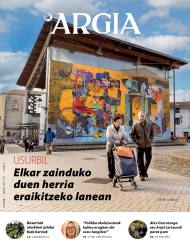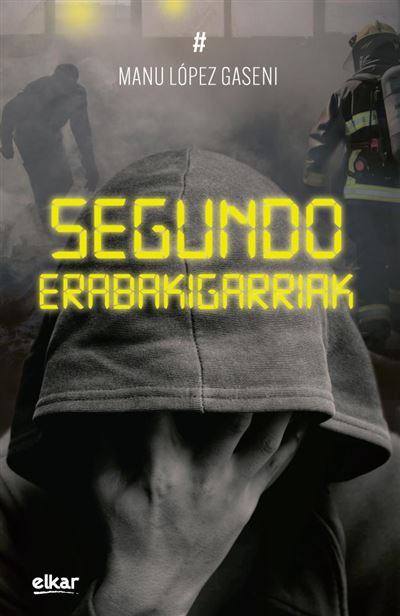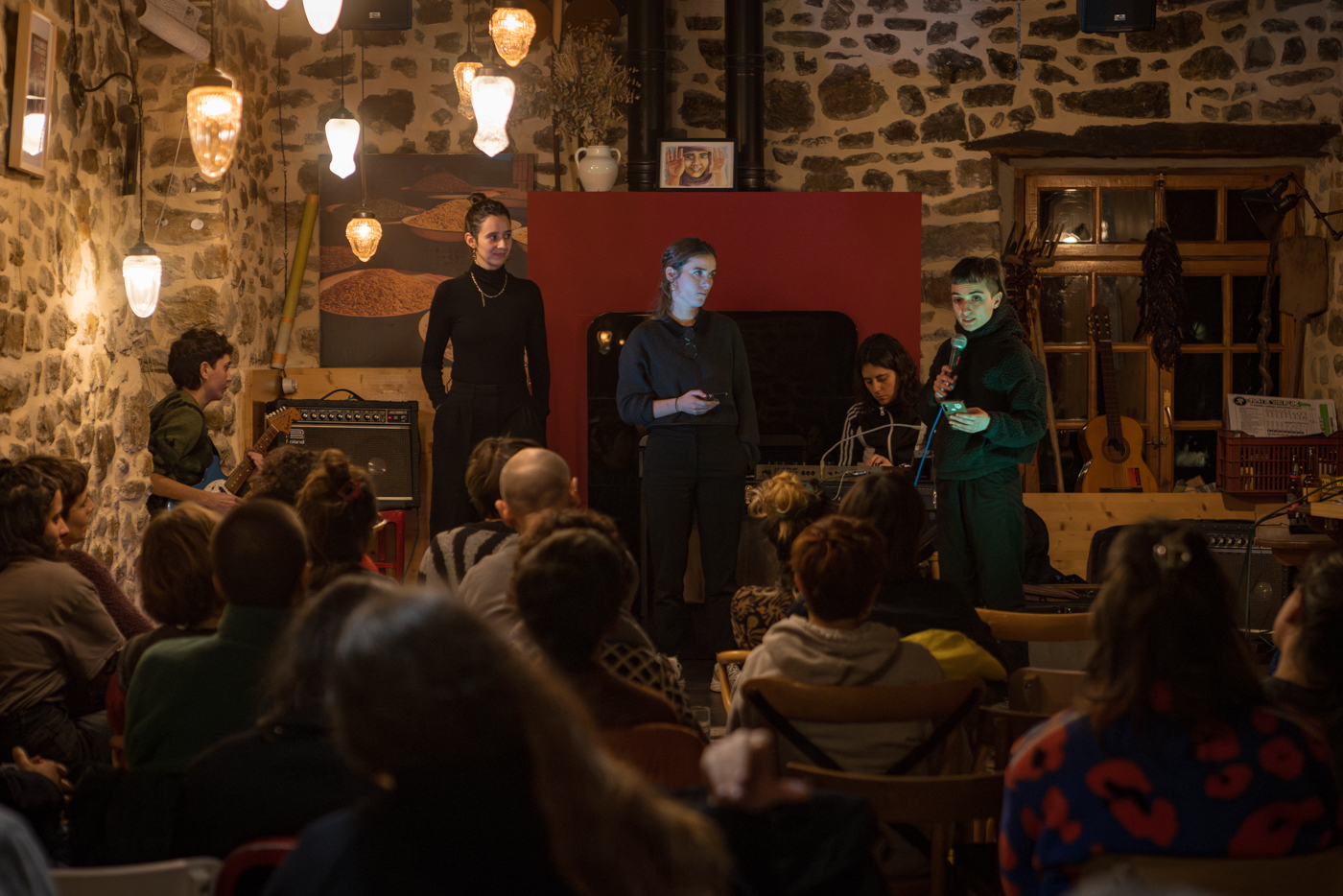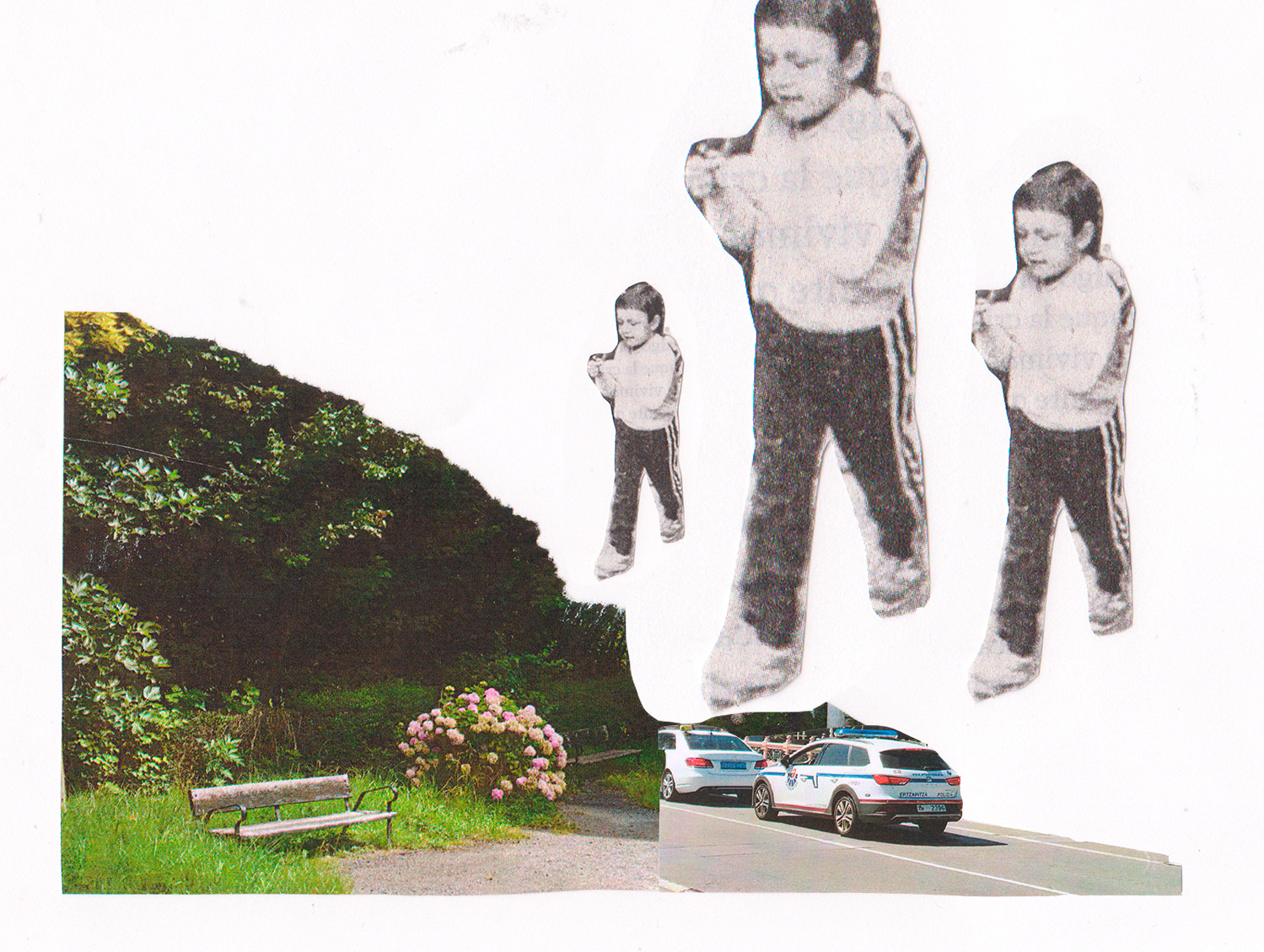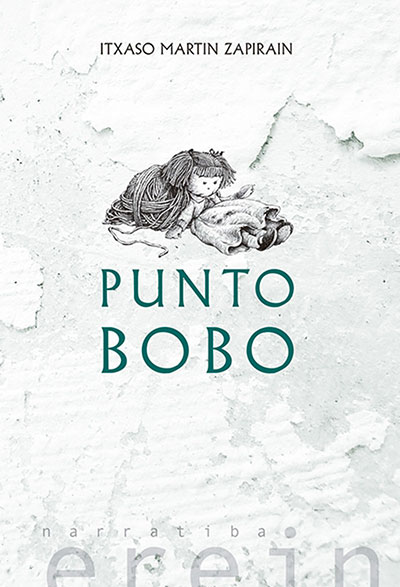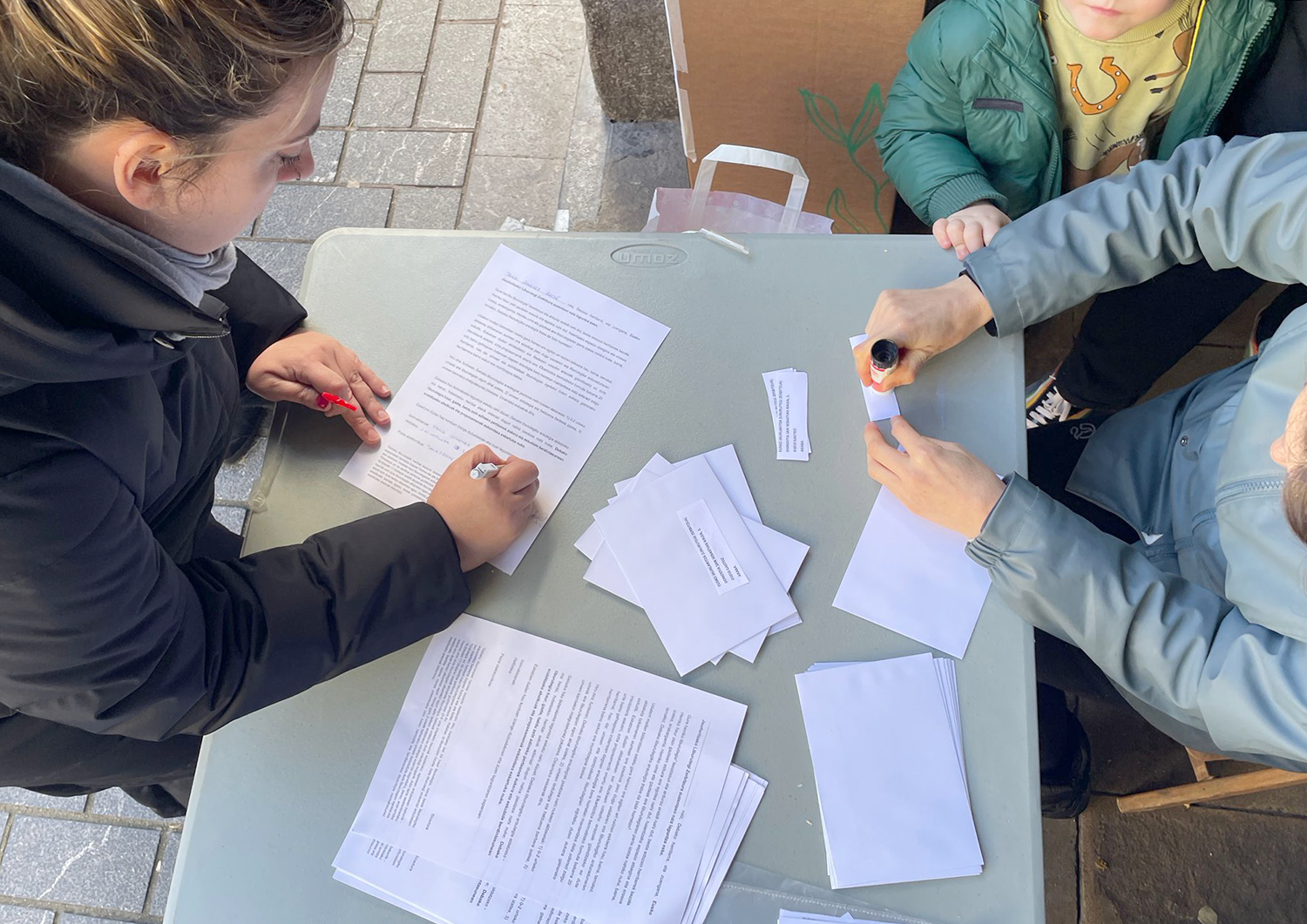The vices of the united literature
- I've fulfilled one of those little dreams I had long ago. I would read paired conversations with real journalists and envy me. I meet Alex Gurrutxaga and Anjel Lertxundi there and here, and I am curious. So I made a date on the fall doors and we were greeted generously by the chacoliners Talai Berri. Here are some of the awaits fluttered from the galerna that was going to bring the afternoon after the morning sargori.

Are you ready?
Alex Gurrutxaga: No. [Laughter]. If you ask me, I will tell you the truth.
Knowing this, we started. How did friendship between the two emerge?
G: I'm going to tell my version. I met Angel in healthy kids, knew and read his books, and I saw this man in the street, and for me he was a figure. Then I was lucky to know the figure and know it. How does the topic say: a very good writer, a better person? In this case it is true.
Anjel Lertxundi: For my part it was a pleasure, and the honor, said of all, when he sent me his thesis to look at me, and I was looking with an incredible illusion. That confidence was very important to me.
Both suffer from literary illness. How do you experience that relationship?
L: I've dedicated your whole life. How many times have I thought what would be without that… I don’t imagine if you don’t read and write down my life. However, I find it more surprising that cultured people do not read. Going through college and going through so many places and how literature, music or similar artistic disciplines doesn't tell you anything; cultured people have never gone to an exhibition.
G: I'm a reader. That's the relationship I have with literature. I'm a Humanities student, I think I'm a student even when I'm a professor and I'm still studying. And in the literature, I'm a reader, especially. If I've published something, it's not because I'm a writer, it's because I read it. I always remember Iratxe Retolaza saying that people who move in literary criticism are always asked when to write. It's the usual question. Or if you write a literary essay, or an academic article, it's the next question, but when should you write a novel? I have never been tempted to do so.
.jpg)
Gurrutxaga (Zarautz, 1988) is a doctor in literature. In his thesis he studied the poetics of Xabier Lete and in 2020 he published in book format the core of his research: Xabier Lete. Poet singing from the homeland. This work earned him the Euskadi Prize for essay in Basque. Today, in addition to being a professor at the UPV/EHU, she collaborates with the pianist Joana Otxoa de Alaiza in the dissemination of Lete's work. Anjel
Lertxundi (Orio, 1948), writer. Although he has also taught, in the last 30 years he has devoted himself to literature. She has worked different genres, especially children and youth literature, narrative and essay. In this sense, two of the works he has published in recent years are: Itzuliz usu begi (Alberdania, 2019), a literary and rigorous reflection on translation, and the peephole in the Desert (Alberdania, 2022), a book of reflection and memory with teselas.
L: But in his texts, in his articles – and above all it is a book by Xabier Lete that clearly demonstrates it – there is no academic writer, there is a person who writes literally literature. Which literature can be written, unfortunately…
G: As can be irreplaceable, yes.
L: In his case, he made his thesis about a writer and then published it as a book. But at least in my opinion, it's possible to do a literary essay even when it talks about science. For example, George Steiner and Albert Einstein were great writers, and their texts are fantastic when they talk about science. But why? They flee from academicism.
G: I don’t know if we have worked hard on this tradition… I have recently read a work by Beatriz Fernández in outreach [Hizkuntza gogogoan; Erein, 2021], and he’s talking about linguistics, but he’s addressing the literary essay. I think we do not have many traditions in this regard, I would like more.
And without the intent of yourself, Alex?
Q: I feel like it, I recognize it. There are things I would like to do and I would say something about the subject, but the essay, or these kinds of books, I think they have something else, and there you have [Anjel Lertxundi] the example of Itzuliz usu usuak: they ask for a huge job to say something like this. There's reading and critical thinking behind it, it's a work of years.
L: Well, this kind of work emerges from the obsessions of a lifetime. One day you have material, but not because you've been collecting, but because you've been remarking, and you also know what you've read and what you don't, and what you should read.
You are friends, but is the relationship between writer and literary critic not conflictive?
G: Let's imagine that now we put the translator where we put the literary critic. How does a writer get along with his translators? I do not know, but I imagine there is a balance between the writer’s relationship with his own texts and with himself. If the writer is more true to himself, because he means to his situation, rather than to his text, he will have a relationship of five hard with the translator; that relationship will be complicated before or after, when the translator says: “This will be just as wrong”… But then there are writers who say “Ene! It's gone." Anjel is the second type. One example is that you haven't translated your texts, for example. That is fidelity to the text. I think those people don't get as bad as the early writers with their translators and critics.
Anjel Lertxundi: “Criticism, comments and all these vicissitudes are all the consequences of literary action (...) in this package it is included that someone did not like their work and that someone considers their work to be bad”
L: Criticism, comments and all these circumstances are consequences of literary action. When you post some of you, you put it for that, and you'd like what you put to be the greatest possible success -- I mean success in terms of meaning. But this package includes the fact that someone did not like their work and that someone considers their work to be bad and, of course, has an obligation to tell him that he also found it to be bad. Then the question is how I will react to this. And there are intimate reactions, which each keeps, and others public. I do not know if I have always acted correctly, but I have always tried to eat my reactions.
G: In literary criticism, lately my impression is that we have on the one hand academic criticism, which does not reach society. And then, in some press reviews, I think prestige is lost. At the same time, people who hit very well the written press criticism, saying it's very bad or not critical, move on social media, in very few characters, saying anything in any way, and I think for many writers that has to be very painful. One thing is to criticize the text by reading the text, arguing it, but today is spreading that slight partition of wood… I have a very bad time with that.
Why did he stop criticising?
G: I got tired and…
L: How long?
G: Five years.
L: So much?
Q: Enough.
What did he get tired of?
G: I find it hard to agree with my texts, Angel knows. And instead, on social media, you could say very light things. I recognize that I lived with injustice, how much I suffered or how much I worked, and then it is better for a famous to say on social media that the book is wonderful. And you may have found many problems in the book, it seems to you that the reading and the argument and the search you have made is not worth it. It happens to a lot of critics, if you're young, or if you're a woman, what you say is justifiable. That was a great deal.
Alex Gurrutxaga: “If the writer is more true to himself, it means that to his situation, than to his text, he will have a five-hard relationship with the translator”
I would like to end with a sweet taste by mouth and, let's say, one of the hobbies you share: Italy.
G: I only spent a year living there [Trenton]; it's not much, but I really enjoyed it, I had very good literary teachers. There I had the first professor who hooked me up to Spanish literature. Then I had a lot to think about: going to Italy to read Calderón de la Barca at ease. It says something about how to teach literature. In Italy they have a great humanitarian tradition and more prestige. There is a great tradition, which comes from humanism and the Renaissance.
L: In my case, Rome was something else: going from fascism to a country that had long overcome fascism. I made two friends right away, two great friends on the same estate. You had a little store and you were a fascist. The other was the doorman of the house and the communist. On Sundays they took the Communist's car and took me to try the cafes of Rome.
G: Fantasy.
L: And what debates they had and what they did not say, politics and everything! I would come home convinced that the next day they wouldn't talk. Well, the next day it seemed like nothing happened! Going through the political environment here, all the silence, all high, of that darkness, and knowing that naturalness, in addition to the caste of the Italians… There is no more university than the one that has taught me.
.jpg)
Decisive seconds
Manu López Gaseni
Beste, 2024
--------------------------------------------------
You start reading this short novel and you feel trapped, and in that it has to do with the intense and fast pace set by the writer. In the first ten pages we will find out... [+]
Istorioetan murgildu eta munduak eraikitzea gustuko du Iosune de Goñi García argazkilari, idazle eta itzultzaileak (Burlata, Nafarroa, 1993). Zaurietatik, gorputzetik eta minetik sortzen du askotan. Desgaitua eta gaixo kronikoa da, eta artea erabiltzen du... [+]
When the dragon swallowed the
sun Aksinja Kermauner
Alberdania, 2024
-------------------------------------------------------
Dozens of books have been written by Slovenian writer Aksinja Kermauner. This is the first published in Basque, translated by Patxi Zubizarreta... [+]
Sometimes I don't know if it's too much. That we're eating a pipe, that we're talking about anything else, that we're bringing it up. We like to speak aloud, to leave almost no pause, to cover the voices, to throw a bigger one. Talk about each one of them, each one of them, what we... [+]
Puntobobo
Itxaso Martin Zapirain
Sowing, 2024
----------------------------------------------------
The title and cover image (Puntobobo, Wool Bite and Rag Doll) will suggest mental health, making the point and childhood, but more patches will be rolled up as the book... [+]
Party and recreation. Oral History of Rock Radical Vasco
Javier 'Jerry' Corral
Books, 2025
------------------------------------------------
Javier Corral ‘Jerry’ was a student of the first Journalism Promotion of the UPV, along with many other well-known names who have... [+]
Itsasoa bete urre
Dani Martirena
Irudiak: Ana Ibañez
Txalaparta, 2022
--------------------------------------------
Liburu honetara barneratzen den irakurleak sentsazio ugari izango ditu. Deigarria da azaleko letren urre kolorea eta zuritasuna, goialdean ageri den... [+]
Hirietako egunerokoa interesatzen zaio Sarah Babiker kazetariari; ez, ordea, postaletako irudia, baizik eta auzoetan, parkeetan, eskoletan, garatzen den bizitza; bertan dabilen jendea. Lurralde horretan kokatzen dira bere artikuluak, baita iaz argitaratu zituen bi lanak ere... [+]
Migranteak
Issa watanabe
1545 argitaletxea, 2024
-------------------------------------------
Ezagutzen ez nuen 1545 argitaletxeak 2024an itzuli eta kaleratu du Issa Watanaberen Migranteak liburua. Animalia talde batek egiten duen migrazio prozesua kontatzen du; eta... [+]









